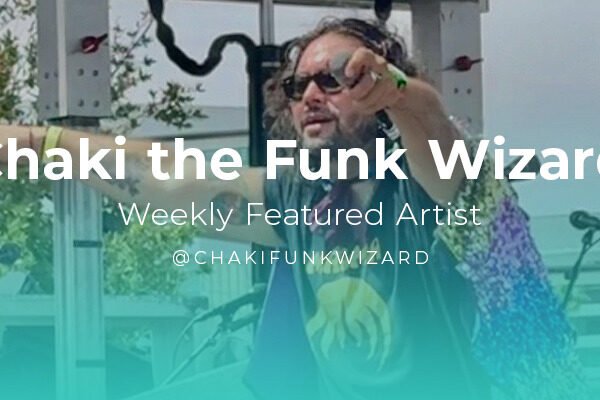Some things become quickly inseparable when paired, for better or worse. In the case of black metal, there are plenty of trappings around this scene that started developing in the ’90s. While misanthropy was often the calling card for this scene, more directed hatred became intertwined with this genre of music that remains to this day. As time has passed there have been countermovements in the black metal scene that are hell bent on changing the notion that black metal’s history must be part of its future. Dawn Ray’d are perhaps the lightning rod for this movement with their very outspoken antifacist and anarchist message, and their unwavering fight for a future free from oppressive politics and economic systems. This week I am proud to bring this band to you as our Weekly Featured Artist. I had the privilege to speak with Simon Barr, the band’s vocalist and violinist about the band’s origins, their personal journeys, and his perspective on a variety of topics that you’d expect.
I wanted to go back to the start, maybe even a little before the start of the band and chart how this group of musicians changed their genre from screamo/skramz and gravitated toward the more caustic, vitriolic venue of black metal. The three members of Dawn Ray’d previously made up the bulk of We Came Out Like Tigers, a screamo band that were active until 2014. I asked Simon about how things were taking shape back then why they decided to move on from this style and into the territory where they now reside:
‘I love screamo, especially the harsher side of it, but that band had run its course I think, and we wanted to do something more heavy and extreme, and had talked about doing a black metal band for a while. Screamo is quite a youthful genre I think, whereas metal has a much wider age range, which has been awesome to see as we ourselves have gotten older. Also I was much more full of hope when I was younger, I was more uncertain of myself and so wrote more emotionally focused lyrics, it all felt appropriate to the time of life we were at, whereas black metal has been an amazing place to be as I’ve grown and changed. I guess we had to learn to play a different type of music, but ultimately it was a very natural and honest transition I think.’
He goes on to indicate where the genre was going during this time as well as the pull toward a harsher sound, the need to clear off a spot within black metal to push back against NSBM, and shine a light on the idea that this space isn’t exclusively for flagrant racism:
‘During our time in screamo there had emerged a trend of much more melodic, clean bands, I guess stemming from the more famous Italian screamo bands, and I honestly really disliked it. I grew up listening to bands on Robotic Empire Records and ThreeOneG, the harsher side of the genre. We pulled away from the scene a bit, and were listening to black metal a lot, and one day we just decided we wanted to commit to something much darker. I don’t know if it’s the best genre for these ideas or not, but you have to fight where you stand I think, and this is a scene that needs to shine a light on the problems within it, NSBM etc.’
It seems that there were several factors that went into the formation of the band from a sonic perspective and also how the band saw themselves at the time. Little did they know they would be challenged from the start. In 2015, Dawn Ray’d released their debut EP, A Thorn, A Blight which was their initial foray into black metal and it was laced with leftist ideas of anarchy and pushing back against the oncoming storm of totalitarian ideas but that wasn’t the only message there. There were moments of personal reflection but this wasn’t enough to offset some of the ire that was brought to them for daring to include political messages in black metal. It didn’t take long for this to embolden and crystalize Dawn Ray’d. The battle had been brought to their door and they had no intention of lying down:
‘Initially we wanted to be a left leaning black metal band, but not necessarily make a big deal of the politics, half the songs on that first EP are personal and not political. We were met with such ire by the black metal scene for daring to be political at all that we just decided to double down and go as hard as we could with the politics! We feel like the fight was brought to us honestly. RABM was nowhere near as common then though, so we felt that there was a massive gap there to be filled, black metal for decent people!’
While many like to behave as if there is only a supposed connection to black metal and politics of hate and other damaging ideologies, it is important to remember that there are entire festivals dedicated to NSBM, openly Nazi bands, and more. While this isn’t an indictment against the genre wholesale – there are plenty of acts which rely on mythology, literature, and escapism – there are problem areas and a proper counter to these has been formed in the last decade or so, with Dawn Ray’d being part of that pushback.
As I continued the conversation with Simon about how the band kept progressing, Behold Sedition Plainsong came up. This was their 2019 album that was released right before the world was plunged into a pandemic and reflecting on where the band was poised right before this was an interesting question. This album was bigger than their debut LP, The Unlawful Assembly in many ways both sonically and in terms of openly calling for strength against the rising tide of hate and division that seemed to only growing stronger. Staying focused on these goals and ideas is not only difficult but also can be tiring. Life can be hard enough to balance without hoping to inspire others:
‘Haha, true, life is hard and definitely feels like it’s getting harder. I feel lucky though, I get to vent all my anger and radical ideas through this music which is incredibly cathartic, and it also helps me gather my thoughts and understand all these struggles better myself as well. As do interviews like this, it is so important to interrogate your own ideas from time to time and see if they hold up!’
Self-reflection is an important task for each of us and it seems that Simon hasn’t lost sight of that, or the value of his position within the band and society that allows him to express these ideals through Dawn Ray’d. To that end, however, the ideas aren’t errantly self-assured as there is reliance on vindication through history and historians:
‘Also, we are right. What we believe is true, and not because I say so, but because people much smarter than me have been writing about this stuff for over a hundred years! With every new crisis I am only more convinced that capitalism is a nightmare and hierarchical organisation only leads to subjugation and abuse. Talking and singing about this, then meeting and talking to other people who feel the same as a result of that is one of the best things about my life honestly! I feel very lucky to have this.’
Luck, as we know it, is a fickle thing and there are aspects to life that simply can’t be controlled, not even remotely. I wanted to talk about the recent pandemic with Simon and get a feel for how that changed or shaped the band from that point on. It’s no secret that this was a time of isolation but also it made and broke many creative endeavors during its peak. ‘I take things for granted a lot less now and have a better understanding of how lucky I have been to travel so much playing music, to have friends from doing this… I really try and remember that, and that one day this band will end, so I should enjoy it while I can.’
At this point I wanted to talk about the new album, To Know the Light. Released in March of this year, for me personally, this is the album from the band that I have connected with the most. From a musical standpoint, it’s a brilliantly paced black metal album that finds new ways to materialize their message with a stronger sense of community and tinges of positivity that creep through. These feelings of optimism are not that the oppressive, broken systems are finally getting better, quite the opposite in fact, but that we can find hope in the world through each other, the collective struggle, and knowledge that we can make a difference. Simon agreed: ‘To Know The Light for me means anarchism and struggle, that is where we find strength and joy, and when you have that knowledge of the world you are strengthened by it. I guess we know that the world is fucked and hangs in the balance, and capitalism holds no answers for us’
As for the new sonic ideas that appear on the new album, these are intentional. As is the way of Dawn Ray’d there is a sense of rebellion and apt lack of regards for the establishment even within the sonic ideas that can work on a black metal album. Of course the violin gives their sound a certain sense of uniqueness, beyond that there are more sprawling songs and even an a capella song on To Know the Light. As to whether or not these changes and ideas were intentionally reaching into new territory, the answer is a resounding affirmation:
‘Yeah totally. I really tried to push myself actually, I had singing lessons, I’ve been doing some violin session work, lots of things to try and expand on what I can do. I also have no interest in sticking to what people consider to be real black metal, I just want to be creative and sing about the things I believe. It has been really rewarding actually exploring all these new avenues. We all listen to a lot of different types of music and it feels natural to draw on that too!’
As I stated earlier, I have felt more connected with this new record than some of their previous efforts, but the reasons for that have been a bit of a mystery to me, at least at first. When listening to the album I read along with the lyrics and have noticed a slight change in posture with how the message – which is unchanged – is being delivered. This was something that came to light specifically with the song “Freedom in Retrograde.” Lines such as ‘I still will fight for freedom for every living thing / If you still sing, then I’ll still sing’ give a slight change in timbre but without sacrificing some of the ideals that this band stands for. It seems that this is more of a unilateral experience than one unique to me. And that change in tone? I think it has a chance to give others a different view of the band’s ideas:
‘Yeah hopefully, actually I think people have connected with this record more intensely I think, and I think some of that is down to the change in tact lyrically. With “Freedom In Retrograde”, I was trying to show what these ideas look like with all the ideology, all the theory stripped away, I just want things to be better. We live in such a divided world, there is a culture war raging, there is sectarianism within protest movements, there are all sorts of divisions, but ultimately I just want people to be free and happy. Maybe we can all realise we are on the same side, we might not agree on everything, but it doesn’t feel like the revolution is coming anytime soon, so let’s fight for others together and put everything else behind us. Also, I wanted it to be clear that I’m not defined by what I am against, but by what I am for, which is love, freedom and the beauty of the world.’
I’ll be honest, when I read this response from Simon, I teared up a little. This is the sort of thing that I personally think that can get lost during all of this discourse of ideology, politics, and even black metal. Yes, this is an extremely naïve-looking concept when it simply lies on the page, but in the end this is the goal. Freedom, beauty, and love.
I couldn’t help but perhaps correlate this slight change in approach to surviving the pandemic and it being at least in part to some of the time of reflection that we all have had. Live music was non-existent, the rich got richer, the poor got sicker, and the amount of things that were exposed during the height of this time that it would be impossible to come out unchanged. Dawn Ray’d didn’t let this make them softer in any way, quite the opposite in fact, but there is a new perspective and a more obvious avenue for unification.
Without a doubt one of the chief and most valid criticisms of any movement is the lack of grace that can arise when looking to enact change. Something that has only been exacerbated by the majority of this discourse being had in online spaces where context and nuance can quickly get lost and endless purity tests bog down progress by allowing perfect to be the enemy of great or even good. It doesn’t take long to see this playing out and stalling forward momentum in a host of spaces and it’s not gone unnoticed. Reactionary ideas die fast and in the end, affect little change. In an interesting way this has led to additional clarity for Simon:
‘I am trying to be less critical of others that are doing things in a different way to me, I am learning to care less about what the far right thinks about us, and I feel post pandemic that we could lose this all at a moment’s notice, so let’s not lose sight of the joy and happy moments. I’m also learning that there is no separation between the personal and the political, we all carry scars from capitalism, and those injuries are rooted in these politics, by work and toil, by colonialism, by sexism, rape culture and abuse, by competition and ideas of success… all these things have links to the system we live under, we are all struggling, and it doesn’t have to be like this.’
One of the most refreshing things that emerged from this conversation is the simple idea that it can be better and that is all the struggle is for: better. Aptly I wanted to close the conversation by talking about the closer on To Know The Light, “Go As Free Companions” a song whose title is inspired by a quote from Lord Elrond from The Lord of the Rings and to my ear has a double meaning. ‘The sun still shines / And it would be a waste / To not only lose tomorrow / But also lose today.’ This in some ways feels like a message to take care of ourselves amid the struggle, but I suspected other layers were at play here:
‘There are two meanings, yes, well spotted! Ha! Partly it is yes, let’s enjoy today because the future is fucked, the earth is dying, life is getting worse, and this might be the best it ever is, so enjoy every positive moment you can. That realisation stems from nihilism actually. The line ‘The sun still shines‘ was inspired by a pamphlet called The Sun Still Rises, so I will let people look up what that is. I recently heard someone say ‘self care is the embodiment of the revolution’, learning to love what we look like despite what advertising tries to tell us, learning to heal from trauma, to confront the difficult things, these all help make us more capable of resisting and partaking in the struggle. If you go into a group project but haven’t dealt with your own shit, it can cause problems socially, it can hold you back in lots of ways and cloud your judgment. Sorting your own body and mind out gives you greater capacity to resist, it gives you more strength to help others. That is something I’ve really grown to understand recently and think it is really important!’

Dawn Ray’d is:
Matthew Broadley – Drums
Fabian Devlin – Guitars
Simon Barr – Vocals, Violin
Dawn Ray’d will be playing festivals this summer, another UK tour with Ragana, a European tour with Iskandr, and are currently booking a Scandinavian tour for this year as well. And there is hope to be in the US again next year too! They are also developing a folk/acoustic set as well, so if anyone wants them to play that, get in touch with them.
Be sure to follow the band on Facebook, Instagram, and you can find their albums on Bandcamp in various formats.
Band photos by Jake Owens.






